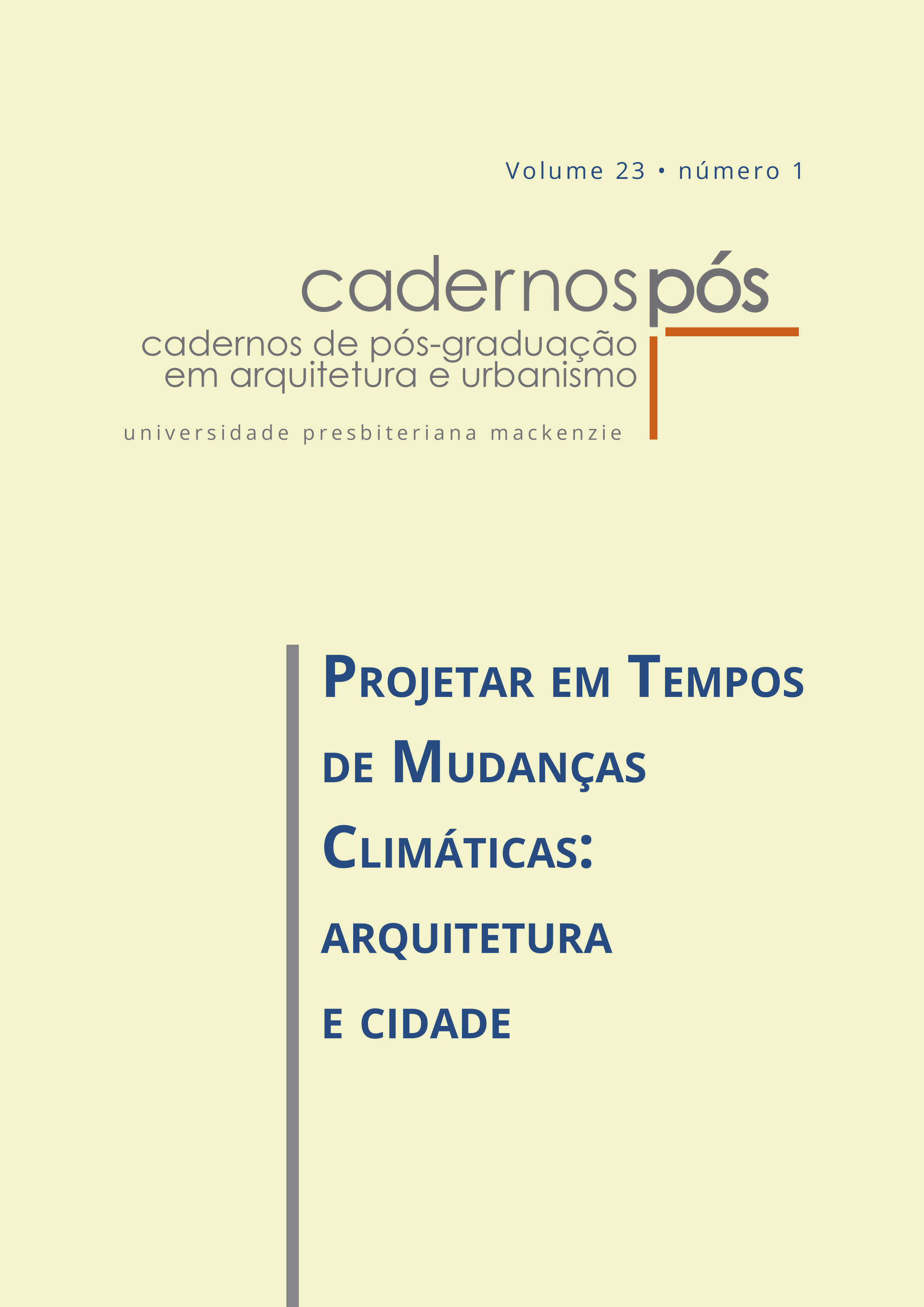Urban resilience: aspects related to human behavior in public green spaces
DOI:
https://doi.org/10.5935/cadernospos.v23n1p130-145Keywords:
Public green spaces; Urban resilience; Environmental perception; Human behavior; Squares.Abstract
The presence of public green spaces in urban centers is essential for numerous urban activities, as well as, it is an alternative to mitigate the consequences of the phenomenon of climate change. However, many cities have public green spaces that are degraded, unsecurity and they are often pressured to be removed from the urban structure, as if they were the cause of presented problems. In order, we discuss the importance of green spaces in the urban structure briefly, in addition about the aspects are involved in the human appropriation of these spaces. This text is the result of the post-doctoral internship in psychology in Victoria, Canada and of academic research in bioclimatic architecture, presenting data from Aracaju’ squares (SE), Brazil. Examples are given to elucidate the ideas and discussion are presented. It is concluded that in order to use public green spaces as an action of urban resilience, it is necessary to offer a redefinition of these spaces by human being, changing your perception and your behavior.
Downloads
References
ANDREWS, M.; GATERSLEBEN, B. Variations in perceptions of danger, fear and preference in a simulated natural environment. Journal of Environmental Psychology, v. 30, n. 4, p. 473-481, 2010. DOI 10.1016/j.jenvp.2010.04.001
BAKLANOV, A.; GRIMMOND, C. S. B.; CARLSON, D.; TERBLANCHE, D.; TANG, X.; BOUCHET, V.; LEE, B.; LANGENDIJK, G.; KOLLI, R. K.; HOVSEPYAN, A. From urban meteorology, climate and environment research to integrated city services. Urban Climate, v. 23, p. 330-341, 2018. DOI 10.1016/j.uclim.2017.05.004
BENINI, S. M.; MARTIN, E. S. Decifrando as áreas verdes públicas. Revista Formação, v. 2, n. 17, p. 63-80, 2010. DOI 10.33081/formacao.v2i17.455
BRITISH COLUMBIA. British Columbia Policing Jurisdiction Crime Trends 2011-2020, Ministry of Public Safety and Solicitor General, 2020. Disponível em: https://www2.gov.bc.ca/assets/gov/law-crime-and-justice/criminal-justice/police/publications/statistics/bc-policing-jurisdiction-crime-trends.pdf. Acesso em: jun. 2022.
BUCKLE, P.; MARS, G.; SMALE, S. New approaches to assessing vulnerability and resilience. The Australian Journal of Emergency Management, v. 15, n. 2, p. 8-14, 2020.
BUENO, S.; LIMA, R. S de. Anuário Brasileiro de Segurança Pública 2020. In: FÓRUM DE SEGURANÇA PÚBLICA, ano 14, 2020. Disponível em: https://forumseguranca.org.br/wp-content/uploads/2021/02/anuario-2020-final-100221.pdf. Acesso em: jun. 2022.
CENTERS FOR DISEASE CONTROL AND PREVENTION (CDC). How to protect yourself and others. Atlanta, 2023. Disponível em: https://www.cdc.gov/coronavirus/2019-ncov/prevent-getting-sick/prevention.html. Acesso em: fev. 2023.
CERQUEIRA, D. (coord.). Atlas da violência 2021. São Paulo: FBSP, 2021. Disponível em: https://www.ipea.gov.br/atlasviolencia/arquivos/artigos/5141-atlasdaviolencia2021completo.pdf. Acesso em: jun. 2022.
CUI, L.; SHI, J. Urbanization and its environmental effects in Shanghai, China. Urban Climate, n. 2, p. 1-15, 2012. DOI 10.1016/j.uclim.2012.10.008
DROSOU, N.; SOETANTO, R.; HERMAWAN, F.; CHMUTINA, K.; BOSHER, L.; HATMOKO, J. U. D. Key factors influencing wider adoption of blue-green infrastructure in developing cities. Water, v. 11, n. 6, 2019. DOI 10.3390/w11061234
EVANS, G. W. The Built Environment and Mental Health. Journal of Urban Health: Bulletin of the New York Academy of Medicine, v. 80, n. 4, p. 536-555, 2003. DOI 10.1093/jurban/jtg063
GIFFORD, R.; McCUNN, L. J. Appraising and designing built environments that promote well-being and healthy behaviour. In: STEG, L.; GROOT, J. I. M. de. (ed.). Environmental Psychology: An Introduction. Ontario: John Wiley & Sons Ltd, 2018. p. 104-112.
GONZÁLEZ, J. E.; LUVALL, J. C.; RICKMAN, D.; COMARAZAMY, D.; PICON, A. J.; HARMSEN, E. W.; PARSIANI, H.; RAMIREZ, N.; VASQUEZ, R. E.; WILLIAMS, R. N.; WAIDE, R. T. B.; TEPLEY, C. A. Urban heat islands developing in coastal tropical cities. Eos, v. 86, n. 42, p. 397-403, 2005. DOI 10.1029/2005EO420001
KAHNEMAN, D.; TVERSKY, A. Prospect theory: an analysis of decision under risk. Econometrica, v. 47, n. 2, p. 263-292, 1979. DOI 10.2307/1914185
LAY, M. C. D.; REIS, A. T. da L. O papel de espaços abertos comunais na avaliação de desempenho de conjuntos habitacionais. Ambiente Construído, Porto Alegre, v. 2, n. 3, p. 25-39, jul./set. 2002. Disponível em: https://seer.ufrgs.br/index.php/ambienteconstruido/article/view/3423/1838. Acesso em: fev. 2023.
MAGNOLI, M. M. Em busca de “outros” espaços livres de edificação. Paisagem e Ambiente: Ensaios, n. 21, 2006. DOI 10.11606/issn.2359-5361.v0i21p141-173
MATTOS, K. A.; CONSTANTINO, N. R. T. Espaços livres urbanos e cidade; produção e gestão. Revista Nacional de Gerenciamento de Cidades, v. 3, n. 16, p. 86-103, 2015. DOI 10.17271/2318847231620151003
MOSER, G. Introdução à psicologia ambiental: pessoa e ambiente. Tradução de Luís Guerreiro Pinto Cacais. Campinas: Editora Alínea, 2018.
OLIVEIRA, M. de; SIBIO, M. T. de; MATHIAS, L. S.; RODRIGUES, B. M.; SAKALEM, M. E.; NOGUEIRA, C. R. Irisin modulates genes associated with severe coronavírus disease (COVID19) outcome in human subcutaneous adipocytes cell culture. Molecular and Cellular Endocrinology, v. 515, 2020. DOI 10.1016,j.mce.2020.110917
PREFEITURA MUNICIPAL DE ARACAJU – PMA. Arquivos em dwg de praças do bairro Inácio Barbosa. Aracaju, 2016.
SANTAMOURIS, M.; HADDAD, S.; SALIARI, M.; VASILAKOPOULOU, K.; SYNNEFA, A.; PAOLINI, R.; ULPIANI, G.; GARSHASBI, S.; FIORITO, F. On the energy impact of urban heat island in Sydney: climate and energy potential of mitigation technologies. Energy & Buildings, n. 166, p. 154-164, 2018. DOI 10.1016/j. enbuild.2018.02.007
SLATER, S. J.; CHRISTIANA, R. W.; GUSTAT, J. Recommendations for keeping parks and green space accessible for mental and physical health during COVID-19 and other pandemics. Preventing Chronic Disease, v. 17, 2020. DOI 10.5888/pcd17.200204
SLOVIC, P. Perception of risk. Science, v. 236, p. 280-285, 1987. DOI 10.1126/ science.3563507
SNELL, R. S. Clinical neuroanatomy. 7th edition. Philadelphia: Lippincott Williams & Wilkins, 2010.
SOUZA FILHO, B. A. B. de; TRITANY, E. F. COVID-19: importância das novas tecnologias para a prática de atividades físicas como estratégia de saúde pública. Cadernos de Saúde Pública, v. 36, n. 5, 2020. DOI 10.1590/0102-311x00054420
TEIXEIRA, C. F. B. Green space configuration and its impact on human behaviour and urban environments. Urban Climate, v. 35, 2021. DOI 10.1016/j.uclim.2020.100746
TEIXEIRA, C. F. B.; SANTOS, I. P. Conjuntos habitacionais populares: relações entre vizinhanças e espaços livres públicos. Revista Jatobá, Goiânia, v. 2, 2020. DOI 10.54686/revjat.v2i.63436
WILDAVSKY, A.; DAKE, K. Theories of risk perception: who fears what and why? Daedalus, v. 119, n. 4, p. 41-60, 1990. Disponível em: https://www.jstor.org/stable/20025337. Acesso em: fev. 2023.
WHITE, I.; O’HARE, P. From rhetoric to reality: which resilience, why resilience, and whose resilience in spatial planning? Environment and Planning C: Government and Policy, v. 32, n. 5, p. 934-950, 2014. DOI 10.1068/c12117
ZHANG, D.; YONG, T. Green building, pro-environmental behavior and wellbeing: evidence from Singapore. Cities, v. 108, p. 1-13, 2021. DOI 10.1016/j.cities.2020.102980
ZHONG-WEI, Y.; JUN, W.; JIANG-JIANG, X.; JIN-MING, F. Review of recent studies of the climatic effects of urbanization in China. Advances in Climate Change Research, v. 7, p. 154-168, 2016. https://doi.org/10.1016/j.accre.2016.09.003
Downloads
Published
Versions
- 2023-06-30 (2)
- 2023-06-30 (1)
How to Cite
Issue
Section
License
Copyright (c) 2023 carla fernanda barbosa teixeira

This work is licensed under a Creative Commons Attribution 4.0 International License.
Authors who publish in this journal agree to the following terms:
a) Authors retain the copyright and grant the journal the right of first publication, with the Project simultaneously licensed under the Creative Commons Attribution License that allows the sharing of the Project with recognition of the authorship and initial publication in this journal.
b) Authors are authorized to assume additional contracts separately for the non-exclusive distribution of the version of the Project published in this journal (e.g., publishing in an institutional repository or as a book chapter), indicating that it was originally published in this journal, with a link to the article.








 Todo o conteúdo de Cadernos de Pós-Graduação em Arquitetura e Urbanismo está licenciado sob
Todo o conteúdo de Cadernos de Pós-Graduação em Arquitetura e Urbanismo está licenciado sob 